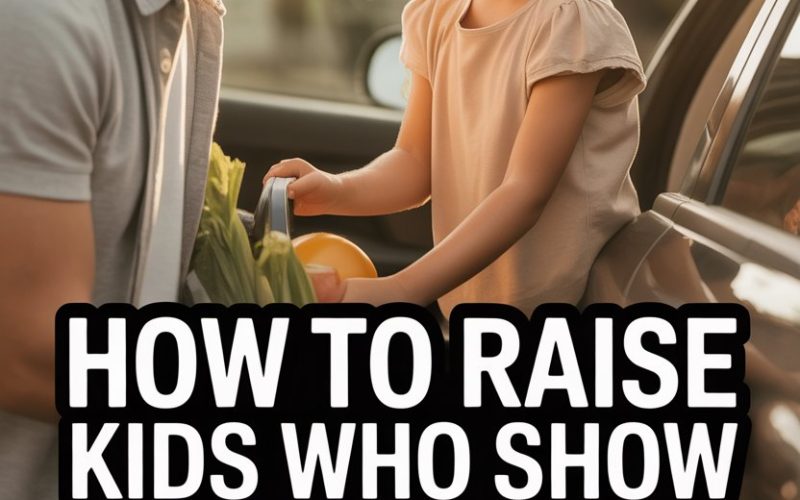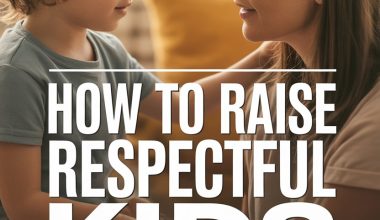Pulling off a polite “please” and “thank you” from a toddler can sometimes feel like catching a unicorn (with a lollipop).
Yet, wouldn’t it be lovely if your child’s respect for others came as naturally as their need for snacks every 17 seconds?
Good news: raising kids who treat others with genuine respect doesn’t require superhuman patience or a PhD in child psychology.
Just some consistent habits, a dash of humour, and the ability to admit when you’ve botched it yourself.
Let’s unravel how to nurture respectful kids—even when the only thing you want to nurture is your third cup of coffee.
Model Respect—Even When No One’s Watching
Children are relentless little copy machines.
If you want offspring who treat others with dignity, start by showing it in everyday moments—especially when you think they’re too absorbed in Bluey to notice.
Speak kindly to your partner, thank the postie, apologise when you’re late, and treat the barista like an actual human being, not just a caffeine dispenser.
Research confirms that kids absorb social behaviours by observing adults. So yes, your child will remember how you muttered about that slow driver in traffic. Oops.
Expect Respect—And Explain What It Means
Assume your child is capable of respectful behaviour, no matter how small they are.
Set clear expectations in plain language: “We speak kindly to each other in this family,” or “We don’t interrupt when someone’s talking.”
Here’s the trick—be specific. Telling a five-year-old to “be respectful” is about as useful as telling a cat to do your taxes.
Try, “When Gran is talking, wait for her to finish before you speak,” or “If you’re upset, use your words, not your hands.”
No need to lecture—short and sweet works wonders, especially when you’re running late for footy practice.
Praise Real Respect, Not Just Polite Parroting
Sure, it’s adorable when your child says “thank you” for their broccoli (even if they promptly feed it to the dog).
But if you only dish out praise for rote politeness, you’ll miss chances to reinforce genuine empathy and thoughtfulness.
Notice when your child lets their sibling go first, helps a mate pick up dropped pencils, or listens to you without rolling their eyes (miracles do happen).
Acknowledge it: “That was kind of you to help Max with his bag,” or “I saw how you waited your turn—nice one.”
Research consistently shows that children respond better to specific praise that highlights effort and intent, rather than blanket compliments (Journal on Child Development).
Teach the Why, Not Just the What
When you’re running on two hours’ sleep and a hope, “Because I said so” can slip out. The thing is, kids are more likely to show respect when they actually understand why it matters.
Explain how their actions make others feel. “When you shout over your friend, it might make them feel like you don’t care what they’re saying.” Or, “When you take turns, everyone gets to have fun.”
A quick chat in the car or even at the dinner table can weave these lessons into daily life—no need for a formal TED Talk.
Let Them Witness Respect in All Directions
Respect isn’t a one-way street, reserved for elders or authority figures. Show your kids how respect flows up, down, and sideways.
Offer your child choices, listen to their opinions, and apologise when you get it wrong. (If you’ve never lost your cool and barked something regrettable after stepping on a rogue piece of Lego, are you even a parent?)
When you admit mistakes and treat your child as a person with valid feelings, you’re teaching respect in its most powerful form.
According to experts at Zero to Three, this kind of respectful parenting fosters kids who internalise these values.
Correct Disrespect Without Shame
Every kid (and every adult) will slip up. When your child is rude, talks back, or forgets basic manners, address it calmly and privately.
Sighing “How could you say that?” in front of the entire family won’t encourage improvement—it will just ignite embarrassment or defensiveness.
Try, “I know you’re upset, but we don’t call people names. Can you tell me what made you feel this way?” Or, “You can be frustrated, but slamming doors isn’t how we handle it.”
A gentle, matter-of-fact tone works wonders, and keeps the focus on behaviour, not character.
There’s a big difference between “That was rude” and “You’re rude.” Kids pick up on this—quickly.
Encourage Curiosity About Differences
Kids are naturally curious about people who look, speak, or live differently. Meet those questions head-on. Talk about diversity in a matter-of-fact way, using books, TV shows, or family outings.
The more your children see respectful curiosity in action, the more they’ll internalise it.
Pick storybooks that highlight empathy and kindness. Share your own experiences about learning from others.
You might be surprised what thoughtful conversations pop up during the bedtime stalling routine.
According to a study published in University of Nevada, children exposed to diversity and respectful discussion tend to be more inclusive and polite.
Create Routines That Reinforce Respect
Family routines are the stealthy ninjas of social skills. Meal times, shared chores, and even bedtime rituals offer endless chances to model and practise respectful behaviour.
Rotate who chooses the family dinner, or who picks the next movie. Take turns speaking about your day, and listen (really listen) to each other’s wins and woes. Pitch in together for chores, even if it means the dishes take twice as long.
These everyday rituals quietly build habits of respect, patience, and teamwork—without anyone realising they’re learning something useful.
Let Natural Consequences Do Some Heavy Lifting
When possible, allow children to experience the natural fallout of disrespectful behaviour—without swooping in with a lecture or punishment.
If your child is rude to a mate at school, resist the urge to ring up and smooth things over.
Ask, “What do you think you can do to make it right?” or “How do you think your friend felt?” Guide them through making amends, but let them do the talking (and apologising) themselves.
According to Dr. Laura Markham, this approach builds accountability and empathy, both essential ingredients for genuine respect.
Don’t Forget Self-Respect
Raising a child who shows respect must include helping them value themselves. Self-respect isn’t vanity—it’s the foundation for treating others well.
Teach your child to set boundaries, say no when something feels wrong, and stand up for themselves kindly. Celebrate their strengths, support their efforts, and remind them it’s okay to make mistakes.
A child who respects themselves is far less likely to lash out or belittle others. Plus, they’ll be better equipped to handle peer pressure, bullying, or that inevitable playground drama.
When You Feel Like Giving Up
Every parent has days when their child’s attitude makes them question everything. If yours has ever glared, stomped, or uttered a phrase that made your eye twitch, welcome to the club.
Respectful kids aren’t born—they’re built, one messy moment at a time. Be patient with them, and yourself. You’re not raising a robot.
Some days you’ll be the paragon of patience; others, you’ll be the cautionary tale. Both are okay.
Tomorrow is another chance to model, teach, and try again (armed with snacks, obviously).
Respect Starts at Home
The secret to raising respectful kids? It’s not whispering magic phrases or enforcing perfect table manners.
It’s choosing, day after day, to show kids what respect looks, sounds, and feels like—even when life is anything but orderly.
Your efforts will sink in. You might not notice it in the heat of a sibling row or a supermarket meltdown, but it’s growing all the same.
And one day, when your child surprises you by holding the door for a stranger or apologising for a sharp word, you’ll know: all those tiny, imperfect lessons are paying off.
Until then, keep modelling, keep teaching, and keep the snacks flowing. Respect grows best in a home full of warmth, consistency, and the occasional well-timed nap.




